
You are likely aware that consistent brushing and flossing habits can prevent tooth decay, but did you know that over 50% of children 6-8 years old have had a cavity in their primary teeth? Many parents are startled to learn that it is a potential problem even before their kid’s adult ones appear.
Then, once it’s diagnosed, they’re even more surprised that their pediatric dentist recommends fillings. It’s easy to assume that repairing cavities is unnecessary if that tooth will be falling out anyway, but that’s not the case! Keep reading to learn more about why filling baby teeth is sometimes necessary.
Why Do Primary Teeth Require Fillings?
There’s a possibility that your little one’s dentist might not recommend filling in a cavity in their baby tooth, but chances are high that they’ll want to mend the damage. There are a few reasons for this, including:
- Your child may be in pain. Cavities can hurt! You wouldn’t want your kid to be in discomfort for any length of time.
- Tooth decay spreads. They may have just one problematic tooth currently, but decay can spread to their surrounding teeth.
- They don’t heal themselves. Most dental issues require treatment to recover because they don’t resolve in time, they only progress.
- Waiting could cost you. The root of their tooth or jaw can be impacted, too, which means more complex and expensive solutions down the road- like an emergency root canal, for example.
As you can see, it’s important to treat a cavity in a baby tooth just like you would for an adult because there are serious consequences if you don’t.
What Types of Fillings Are Used for Children?
In some cases, your dentist might recommend a silver amalgam filling because it’s a more affordable solution than composite resin. Since that tiny tooth will eventually fall out, there’s less risk of metal corrosion from the materials, and some parents prefer to pay less. However, metal amalgam restorations usually contain mercury as well, which is toxic and can be harmful when it lives in your mouth.
Because there are some potential health risks associated with having metallic alloys in your child’s teeth, your pediatric dentist could just as well recommend the usual composite resin material. This can be tooth-colored to be more visually appealing, and they won’t put your little one’s well-being on the line.
How Can I Prevent Childhood Cavities?
Often, a diet that’s high in sugar or acidic ingredients is the culprit behind early cavities. You can prevent one from developing by:
- Switching snacks. Offer fresh fruits, vegetables, or dairy products like yogurt in place of sweet treats.
- Establishing an oral hygiene routine. Your kid should be brushing and flossing their teeth morning and night just like you do.
- Using fluoride toothpaste. Many brands of toothpaste for children are fortified with fluoride which restores their enamel to avoid tooth decay.
- Scheduling dental visits. Your little one benefits from seeing the dentist every 6 months for a checkup and professional cleaning.
By taking the right precautions, you can help keep your child’s baby teeth happy and healthy until their new ones grow in!
About the Practice
At Healthy Kids Dentistry, your child benefits from a team of dentists who are passionate about overseeing growing smiles. They understand that sometimes cavities develop despite preventative care, so they provide sealants to minimize the risk, as well as fillings to mend them if they appear. They also provide silver diamine fluoride treatments to treat them and prevent them from spreading. If you’d like to schedule a checkup, you’re welcome to request one on the website or by calling (301) 844-6999.


